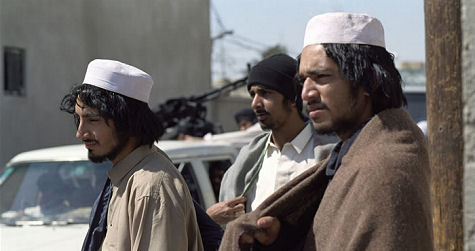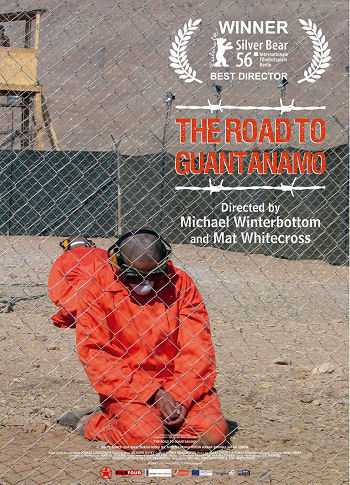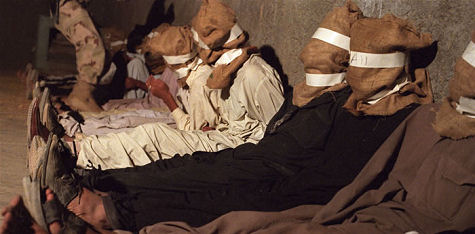War is Cruel
I finally caught up this morning with Michael Winterbottom and Mat Whitecross’s The Road to Guantanmo (Roadside, 6.23). I realize that I’m expected to jump up and down like many critics did when this half-doc, half-recreated drama had its debut last February at the Berlin Film Festival, but I don’t quite feel it…sorry.
I never felt less than absorbed by Guantanamo. I respected and believed what I was seeing…but I didn’t feel all that heavily caught up in it for reasons I’ll soon explain.

Rizwan Ahmed, Farhad Harun and Afran Usman, although not necessarily in left-to-right order. (If anyone can help…)
Guantanamo is an anti-American political horror film. It’s a true story of three young British Muslims who made an ill-advised visit to Afghanistan after celebrating a wedding in neighboring Pakistan in October 2001. The upshot was that they were rounded up as suspected Al Queada collaborators and later flown to the U.S military base in Guantanamo, Cuba, and then detained for over two years.
I don’t mean to say that the film has an anti-American attitude — the facts about what happened to these guys are damning in and of themselves.
< ?php include ('/home/hollyw9/public_html/wired'); ?>
It’s a sad portrait of what undoubtedly happened to many innocent Muslims unlucky enough to get caught up in America’s Mideast assault on all suspected 9/11 collaborators and/or supporters, in the weeks that followed the World Trade Center attacks.
The stories of Shafiq Rasul, Ruhel Ahmed and Asif Iqral (who recount their saga in talking-head footage while being portrayed in the dramatic sections by Rizwan Ahmed, Farhad Harun and Afran Usman) are shocking, pathetic, appalling. Their brutal treatment at the hands of American troops and various U.S. intelligence officers smells like stupidity, ignorance and racism every step of the way.
The heart of the film is the depiction of their abusive treatment at Guantanamo’s Camp X-Ray and Camp Delta. Geneva Convention be damned — America was enraged and hell-bent on vengeance after 9/11, and these poor guys caught the brunt of it.

But I have to say I felt a certain distance from their story, despite the repellent nature of their treatment and the deplorable behavior of their captors, because their decision to travel to Afghanistan in the first weeks after 9/11 was awfully reckless.
The real guys say to the camera that no one expected American troops to come thundering into Afghanistan so they were caught unawares…to which one can only say, “Come again?” The entire world knew that US forces were going to hit Afghanistan in a search for Osama bin Laden. Anyone watching CNN knew that Afghanistan was definitely not a smart place to be back then, especially if you were a Muslim from England.
Nonetheless, with all manner of military Armageddon being predicted to slam into Afghanistan by CNN’s Wolf Blitzer and every other media guy in the U.S. and Britain, these three dudes decided to visit that beleagured country because it seemed like a good idea at the time.
A little perspective, if I may: Berlin women were raped by Russian soldiers. Those conquered by Roman troops in the ancient days were humiliated and slaughtered by God-knows-how-many-thousands? Innocent people have been getting victimized, bludgeoned and chewed up by wars for thousands of years. The conquering army marches in, looking to punish and subjugate (or interrogate), and those too weak or old or dumb to get out of their way catch hell.

So Lord knows it’s a horrid world when warriors pick up the sword, but only a careless person walks into a potentially lethal situation without fully considering the consequences.
I’m not saying that the “Tipton 3” (the victims were all from the British town of Tipton) were stupid, but they sure didn’t think things through.
In fact, given the worked-up state that Americans were known to be in after 9/11 and the virtual certainty that bombs would soon be falling upon Taliban forces and suspected Al Queada sympathizers in that region, why didn’t the Pakistani woman that the British-residing groom (a guy named Monir, who later disappeared) intended to marry come to England instead, so both parties would be out of the danger zone?
The first half-hour of Guantanamo, which quickly intros the trio and begins the renactment of their story, immediately pulls you in. Their initial visit, fleeing the bombs, seeing dead victims being buried…all of it feels authentic and then some.
The pace slows, naturally, after their capture by British troops in Afghanistan, their being handed over to the U.S. military and taken first to Kandahar Air Base (where the beatings and interrogations start) and then flown to Guantanamo in January 2002.

The poor guys are kept inside chain-linked cells that are always lit and resemble dog kennels. No sleep, constant inspections, berated and brutalized…all depicted with terrible realism.
They’re interrograted by careless intelligence officers who claim to have video footage of them attending an Osama bin Laden speech, which of course the three guys deny.
And they’re beaten up and shat upon in all kinds of grotesque ways. The most Orwellian torture they’re put through involves being tied up and forced to absorb super-loud heavy metal music with incessant strobe lights flashing.
Their innocence is eventually discovered in 2004 and they’re slowly, gradually freed. Winterbottom and Whitecross remind us, however, that 500 or so prisoners are still sweating it out in Guantanamo.
But my basic problem remains: I didn’t identify with the Tipton 3 because if I were Muslim, I certainly wouldn’t have travelled to the Middle East for a wedding in the immediate wake of 9/11. I mean, who would? Think about it.









